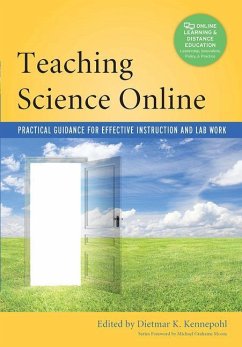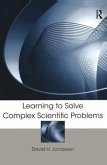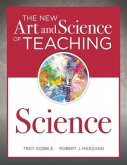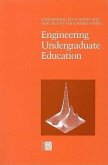Teaching Science Online
Practical Guidance for Effective Instruction and Lab Work
Herausgeber: Kennepohl, Dietmar
Teaching Science Online
Practical Guidance for Effective Instruction and Lab Work
Herausgeber: Kennepohl, Dietmar
- Broschiertes Buch
- Merkliste
- Auf die Merkliste
- Bewerten Bewerten
- Teilen
- Produkt teilen
- Produkterinnerung
- Produkterinnerung
With the increasing focus on science education, growing attention is being paid to how science is taught. This book presents the guidance of expert science educators from around the globe. They describe key concepts, delivery modes and emerging technologies, and offer models of practice. The book places particular emphasis on experimentation, lab and field work as they are fundamentally part of the education in most scientific disciplines.
Andere Kunden interessierten sich auch für
![Learning to Solve Complex Scientific Problems Learning to Solve Complex Scientific Problems]() David H Jonassen (ed.)Learning to Solve Complex Scientific Problems80,99 €
David H Jonassen (ed.)Learning to Solve Complex Scientific Problems80,99 €![Fostering Success of Ethnic and Racial Minorities in Stem Fostering Success of Ethnic and Racial Minorities in Stem]() Fostering Success of Ethnic and Racial Minorities in Stem63,99 €
Fostering Success of Ethnic and Racial Minorities in Stem63,99 €![The Pocket Book of Backyard Experiments: Discover the Laboratory in Your Garden The Pocket Book of Backyard Experiments: Discover the Laboratory in Your Garden]() Helen PilcherThe Pocket Book of Backyard Experiments: Discover the Laboratory in Your Garden9,99 €
Helen PilcherThe Pocket Book of Backyard Experiments: Discover the Laboratory in Your Garden9,99 €![The New Art and Science of Teaching Science The New Art and Science of Teaching Science]() Brett ErdmannThe New Art and Science of Teaching Science33,99 €
Brett ErdmannThe New Art and Science of Teaching Science33,99 €![Engineering Undergraduate Education Engineering Undergraduate Education]() National Research CouncilEngineering Undergraduate Education46,99 €
National Research CouncilEngineering Undergraduate Education46,99 €![Monday Mystery Science Demonstrations: Two Years of Weekly Science Demonstrations That Teachers Can Buy or Build Monday Mystery Science Demonstrations: Two Years of Weekly Science Demonstrations That Teachers Can Buy or Build]() Robert FarberMonday Mystery Science Demonstrations: Two Years of Weekly Science Demonstrations That Teachers Can Buy or Build13,99 €
Robert FarberMonday Mystery Science Demonstrations: Two Years of Weekly Science Demonstrations That Teachers Can Buy or Build13,99 €![Why Science? Why Science?]() James TrefilWhy Science?27,99 €
James TrefilWhy Science?27,99 €-
-
-
With the increasing focus on science education, growing attention is being paid to how science is taught. This book presents the guidance of expert science educators from around the globe. They describe key concepts, delivery modes and emerging technologies, and offer models of practice. The book places particular emphasis on experimentation, lab and field work as they are fundamentally part of the education in most scientific disciplines.
Hinweis: Dieser Artikel kann nur an eine deutsche Lieferadresse ausgeliefert werden.
Hinweis: Dieser Artikel kann nur an eine deutsche Lieferadresse ausgeliefert werden.
Produktdetails
- Produktdetails
- Verlag: Taylor & Francis Ltd (Sales)
- Seitenzahl: 274
- Erscheinungstermin: 3. August 2016
- Englisch
- Abmessung: 249mm x 175mm x 23mm
- Gewicht: 499g
- ISBN-13: 9781620361887
- ISBN-10: 1620361884
- Artikelnr.: 41963337
- Herstellerkennzeichnung
- Libri GmbH
- Europaallee 1
- 36244 Bad Hersfeld
- gpsr@libri.de
- Verlag: Taylor & Francis Ltd (Sales)
- Seitenzahl: 274
- Erscheinungstermin: 3. August 2016
- Englisch
- Abmessung: 249mm x 175mm x 23mm
- Gewicht: 499g
- ISBN-13: 9781620361887
- ISBN-10: 1620361884
- Artikelnr.: 41963337
- Herstellerkennzeichnung
- Libri GmbH
- Europaallee 1
- 36244 Bad Hersfeld
- gpsr@libri.de
Dietmar Kennepohl is Professor of Chemistry and Associate Vice President Academic at Athabasca University (AU) Canada's Open University. He graduated Summa Cum Laude from McMaster University with a B.Sc. (Honours) degree in chemistry and continued directly into his doctoral studies at the University of Alberta in main group synthetic chemistry. Before coming to Athabasca University he also did a post-doctoral fellowship at the University of Guelph and was an Alexander von Humboldt Fellow at the Universität Göttingen in Germany. Most of his teaching experience has been in a distributed and online setting. He holds both university and national teaching awards. Over the years, his research interests have included chemical education as well as petroleum, main group and coordination chemistry. His research in chemical education includes online chemistry courses and concentrates on the use of innovative distance delivery methods for undergraduate laboratory work. Michael G. Moore is known in academic circles for his leadership in promoting the scholarship of distance education and online learning. He published his first statement of theory about distance education in 1972, and has achieved a number of firsts in this field.While teaching the first graduate course in this subject at University of Wisconsin in the mid 70's, he was contributory to founding the national annual conference there. Appointed to The Pennsylvania State University in 1986, he founded the first American journal (American Journal of Distance Education) and established the first sequence of taught graduate courses, including the first such courses taught online. Moore has served on the editorial boards of all the main journals of distance education, and about a hundred publications include the books, Contemporary Issues in American Distance Education (Pergamon Press, 1990), Distance Education: a Systems View, co-authored with G. Kearsley (Wadsworth Publishers, Third Edition, 2011 in press), p
Foreword-Michael G. Moore Acknowledgments Introduction. Setting the
Stage-Dietmar K. Kennepohl Part One. The Basics of Getting Science Courses
Online 1. The Basics of Getting Biology Courses Online-Wendy Wright,
Jennifer Mosse, Barbara C. Panther 2. Teaching Undergraduate Chemistry by
Distance and Online. Lessons from the Front Line-Peter Lye, Erica Smith 3.
Developing Online Earth Science Courses-Kevin F. Downing 4. Physics
Teaching in Distance Education-Robert Lambourne and Nicholas Braithwaite
Part Two. Applications Case Studies and Special Topics 5. Science Online.
Bringing the Laboratory Home-Mary V. Mawn 6. Practical Biology at a
Distance. How Far Can We Go With Online Distance Learning?-Mark C. Hirst
and Hilary A. MacQueen 7. Assessment in Physics Distance Education.
Practical Lessons at Athabasca University-Farook Al-Shamali and Martin
Connors 8. Computer-Based Laboratory Simulations for the New Digital
Learning Environments-Jessie Webb, Richard Swan, and Brian F. Woodfield 9.
Remote Access Laboratory Equipment for Undergraduate Science
Education-Daniel M. Branan, Paul Bennett, and Nick Braithwaite 10. Situated
Science Learning for Higher Level Learning With Mobile Devices-Brett
McCollum 11. Online Delivery of Field- and Laboratory-Based Environmental
and Earth Sciences Curriculum-Ron Reuter 12. Enabling Remote Activity.
Widening Participation in Field Study Courses-Trevor Collins, Sarah Davies,
and Mark Gaved 13. Collaborative e-learning in Pharmacy. Design,
Evaluation, and Outcomes of a European Cross-Border Project-Marion
Bruhn-Suhr, Dorothee Dartsch, and Jasmin Hamadeh 14. Online Professional
Development for Australian Science Teachers. Developing and Deploying a
Curriculum Evaluation Model-Karen Spence, Jennifer Donovan, and P. A.
Danaher Part Three. Summary and Future Trends The Future Starts
Today-Dietmar K. Kennepohl Appendix A. Online Versus Face-to-Face
Approaches for Various Learning Activities Appendix B. Selected Online
Resources Editor and Contributors Index
Stage-Dietmar K. Kennepohl Part One. The Basics of Getting Science Courses
Online 1. The Basics of Getting Biology Courses Online-Wendy Wright,
Jennifer Mosse, Barbara C. Panther 2. Teaching Undergraduate Chemistry by
Distance and Online. Lessons from the Front Line-Peter Lye, Erica Smith 3.
Developing Online Earth Science Courses-Kevin F. Downing 4. Physics
Teaching in Distance Education-Robert Lambourne and Nicholas Braithwaite
Part Two. Applications Case Studies and Special Topics 5. Science Online.
Bringing the Laboratory Home-Mary V. Mawn 6. Practical Biology at a
Distance. How Far Can We Go With Online Distance Learning?-Mark C. Hirst
and Hilary A. MacQueen 7. Assessment in Physics Distance Education.
Practical Lessons at Athabasca University-Farook Al-Shamali and Martin
Connors 8. Computer-Based Laboratory Simulations for the New Digital
Learning Environments-Jessie Webb, Richard Swan, and Brian F. Woodfield 9.
Remote Access Laboratory Equipment for Undergraduate Science
Education-Daniel M. Branan, Paul Bennett, and Nick Braithwaite 10. Situated
Science Learning for Higher Level Learning With Mobile Devices-Brett
McCollum 11. Online Delivery of Field- and Laboratory-Based Environmental
and Earth Sciences Curriculum-Ron Reuter 12. Enabling Remote Activity.
Widening Participation in Field Study Courses-Trevor Collins, Sarah Davies,
and Mark Gaved 13. Collaborative e-learning in Pharmacy. Design,
Evaluation, and Outcomes of a European Cross-Border Project-Marion
Bruhn-Suhr, Dorothee Dartsch, and Jasmin Hamadeh 14. Online Professional
Development for Australian Science Teachers. Developing and Deploying a
Curriculum Evaluation Model-Karen Spence, Jennifer Donovan, and P. A.
Danaher Part Three. Summary and Future Trends The Future Starts
Today-Dietmar K. Kennepohl Appendix A. Online Versus Face-to-Face
Approaches for Various Learning Activities Appendix B. Selected Online
Resources Editor and Contributors Index
Foreword-Michael G. Moore Acknowledgments Introduction. Setting the
Stage-Dietmar K. Kennepohl Part One. The Basics of Getting Science Courses
Online 1. The Basics of Getting Biology Courses Online-Wendy Wright,
Jennifer Mosse, Barbara C. Panther 2. Teaching Undergraduate Chemistry by
Distance and Online. Lessons from the Front Line-Peter Lye, Erica Smith 3.
Developing Online Earth Science Courses-Kevin F. Downing 4. Physics
Teaching in Distance Education-Robert Lambourne and Nicholas Braithwaite
Part Two. Applications Case Studies and Special Topics 5. Science Online.
Bringing the Laboratory Home-Mary V. Mawn 6. Practical Biology at a
Distance. How Far Can We Go With Online Distance Learning?-Mark C. Hirst
and Hilary A. MacQueen 7. Assessment in Physics Distance Education.
Practical Lessons at Athabasca University-Farook Al-Shamali and Martin
Connors 8. Computer-Based Laboratory Simulations for the New Digital
Learning Environments-Jessie Webb, Richard Swan, and Brian F. Woodfield 9.
Remote Access Laboratory Equipment for Undergraduate Science
Education-Daniel M. Branan, Paul Bennett, and Nick Braithwaite 10. Situated
Science Learning for Higher Level Learning With Mobile Devices-Brett
McCollum 11. Online Delivery of Field- and Laboratory-Based Environmental
and Earth Sciences Curriculum-Ron Reuter 12. Enabling Remote Activity.
Widening Participation in Field Study Courses-Trevor Collins, Sarah Davies,
and Mark Gaved 13. Collaborative e-learning in Pharmacy. Design,
Evaluation, and Outcomes of a European Cross-Border Project-Marion
Bruhn-Suhr, Dorothee Dartsch, and Jasmin Hamadeh 14. Online Professional
Development for Australian Science Teachers. Developing and Deploying a
Curriculum Evaluation Model-Karen Spence, Jennifer Donovan, and P. A.
Danaher Part Three. Summary and Future Trends The Future Starts
Today-Dietmar K. Kennepohl Appendix A. Online Versus Face-to-Face
Approaches for Various Learning Activities Appendix B. Selected Online
Resources Editor and Contributors Index
Stage-Dietmar K. Kennepohl Part One. The Basics of Getting Science Courses
Online 1. The Basics of Getting Biology Courses Online-Wendy Wright,
Jennifer Mosse, Barbara C. Panther 2. Teaching Undergraduate Chemistry by
Distance and Online. Lessons from the Front Line-Peter Lye, Erica Smith 3.
Developing Online Earth Science Courses-Kevin F. Downing 4. Physics
Teaching in Distance Education-Robert Lambourne and Nicholas Braithwaite
Part Two. Applications Case Studies and Special Topics 5. Science Online.
Bringing the Laboratory Home-Mary V. Mawn 6. Practical Biology at a
Distance. How Far Can We Go With Online Distance Learning?-Mark C. Hirst
and Hilary A. MacQueen 7. Assessment in Physics Distance Education.
Practical Lessons at Athabasca University-Farook Al-Shamali and Martin
Connors 8. Computer-Based Laboratory Simulations for the New Digital
Learning Environments-Jessie Webb, Richard Swan, and Brian F. Woodfield 9.
Remote Access Laboratory Equipment for Undergraduate Science
Education-Daniel M. Branan, Paul Bennett, and Nick Braithwaite 10. Situated
Science Learning for Higher Level Learning With Mobile Devices-Brett
McCollum 11. Online Delivery of Field- and Laboratory-Based Environmental
and Earth Sciences Curriculum-Ron Reuter 12. Enabling Remote Activity.
Widening Participation in Field Study Courses-Trevor Collins, Sarah Davies,
and Mark Gaved 13. Collaborative e-learning in Pharmacy. Design,
Evaluation, and Outcomes of a European Cross-Border Project-Marion
Bruhn-Suhr, Dorothee Dartsch, and Jasmin Hamadeh 14. Online Professional
Development for Australian Science Teachers. Developing and Deploying a
Curriculum Evaluation Model-Karen Spence, Jennifer Donovan, and P. A.
Danaher Part Three. Summary and Future Trends The Future Starts
Today-Dietmar K. Kennepohl Appendix A. Online Versus Face-to-Face
Approaches for Various Learning Activities Appendix B. Selected Online
Resources Editor and Contributors Index








